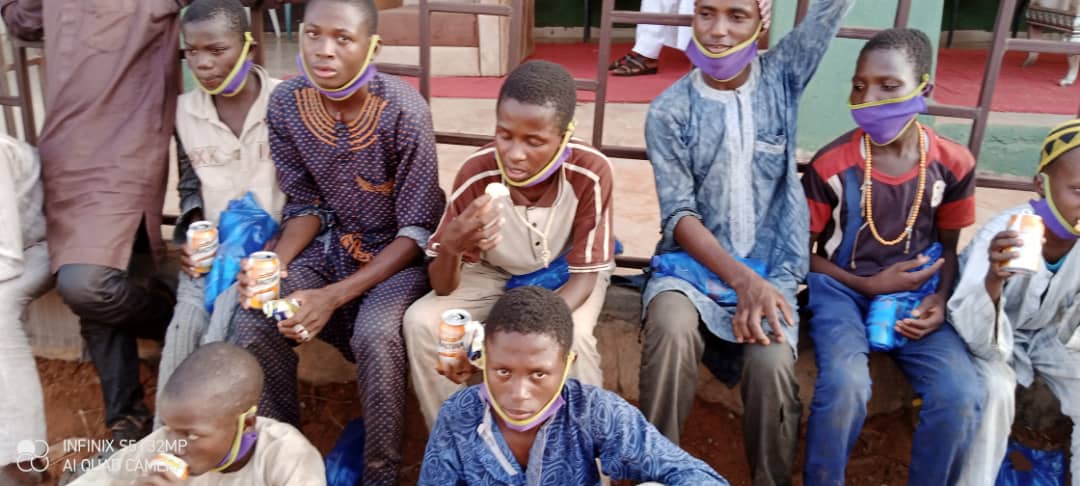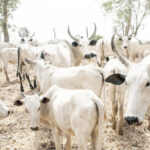The term “almajiri” originates from the Arabic word “Al muhajirun,” meaning a person who migrates in search of Islamic knowledge. However, in recent times, the term has been bastardised to refer to young people who beg on the streets for survival.
Recently, while taking a stroll through the vibrant streets of Maiduguri, I discovered a poignant scene that projected the harsh realities faced by the almajirai.
Amidst the bustling city, a melon seller’s stall caught my attention, and I was drawn to the sweet aroma of fresh melons.
However, my encounter with the melons was overshadowed by the appearance of a group of almajirai, their eyes filled with longing and curiosity.
- 2 nabbed over murder of man accused of witchcraft
- Children abandon schools in Bayelsa community due to lack of teachers
These young children, aged around 10 to 12, were dressed in tattered clothes and bare feet, and evident signs of malnutrition and hardship. They eagerly waited for scraps of melon, their faces lighting up with joy when they received a slice from the melon seller. This brief moment of happiness was a stark contrast to the harsh realities they faced daily.
The encounter left me pondering the question: who was responsible for failing these young children? Was it their parents, the government, or a systemic failure? The answer was complex, but one thing was clear – Nigeria had failed in its responsibility towards these children.
The almajirai’s plight is a painful reality that demands urgent attention and collective effort to provide them with basic necessities like shelter, food, and education.
Unfortunately, the leadership entrusted with addressing this issue often remains ignorant of its gravity, and tangible action is lacking.
According to UNICEF, there are approximately 10 million out-of-school children in Nigeria, with 81 per cent being almajirai. These children are forced to beg on the streets, making them prone to hunger, drug abuse, and recruitment by terrorists.
The Jonathan administration’s Almajiri schools programme, launched in 2012, aimed to incorporate Western education into the Islamic learning system. However, the programme failed due to poor implementation, lack of funding, and limited acceptance by the intended beneficiaries.
Former president Muhammadu Buhari, in 2023, signed the Almajiri Bill into law as his last act as the President of the Federal Republic of Nigeria. Despite that, the almajiri crisis is still a prominent issue in Northern Nigeria today.
The above shows that the problem is not in the creation of problem-solution policies but rather in implementation and maintenance.
The consequences of this failure are dire. The almajirai are easily lured into drug abuse, political thuggery, and even recruitment by terrorists. These children, brainwashed and exploited, can become tools of destruction in our society in the sense that:
They can be used by corrupt political leaders to disrupt electoral processes by snatching ballot boxes, rigging elections or even frightening the electorate from voting, therefore, paving the way for incompetent people to be in power, further disintegrating their lives and crippling the democracy of Nigeria.
They can also be brainwashed and used as suicide bombers by terrorists to cause havoc and chaos in the country.
Additionally, many almajirai, vulnerable and desperate to survive, might turn to drugs as a coping mechanism for their difficult circumstances, leading to addiction and serious health problems. Others become involved in drug dealing as a means of survival, putting them at risk of arrest and violence, further increasing the crime rate in our society.
The re-emergence of Boko Haram in Maiduguri is a stark reminder of the consequences of neglecting the almajiri crisis. The group’s ideology preys on the vulnerability of these children, offering them a sense of purpose and belonging.
We have all seen what Boko Haram did to Nigeria, killing tens of thousands of people. We should not let that repeat itself. We should not let them take advantage of these innocent and naïve children as a means to grow their numbers.
To address the issue, we need all hands on deck. The government – federal, state and local government – must take the bull by its horns and not only make policies but also ensure the proper implementation and maintenance of the almajiri initiative programmes.
Emirs, village heads and community leaders must also contribute by helping to raise awareness and support initiatives that address the almajiri crisis.
As for the parents, they should ensure that they only give birth to the number of children that they can care and cater for.
I urge Nigerians to also remember that as citizens of this great country, we are all stakeholders. What affects one region can shake all other regions and hinder the smooth running of the country at large. Therefore, we must not let the government shoulder the burden of solving this problem alone.
We must all come together to amplify the voices of the almajirai, assist in ways that we can no matter how little (charity, sponsoring their education, donating be it food chairs, tables, writing materials etc to the schools) and work towards creating a more just and equitable society where every child can access the fundamental rights they deserve.
Only then can we salvage the future of these children, the future of our leaders of tomorrow. Only then can we truly say we are working towards a brighter future for all in Nigeria, rather than a future where the rich are always becoming richer and the poor always becoming poorer.
All eyes are now on the National Commission for the Prohibition of Child Begging and Other Related Matters eagerly waiting to see how the commission will address the systemic issues surrounding the almajiri crisis. The nation waits with bated breath to see if the commission will rise to the challenge and usher in a new era of hope and opportunity for the Almajirai.
Aisha Dahuwa is a Mass Communication student at Nile University of Nigeria, Abuja

 Join Daily Trust WhatsApp Community For Quick Access To News and Happenings Around You.
Join Daily Trust WhatsApp Community For Quick Access To News and Happenings Around You.


